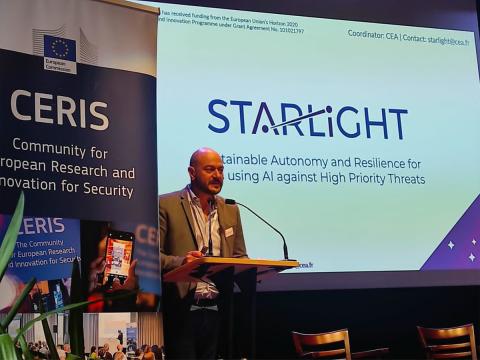
On March 5, 2024, the STARLIGHT project was presented at the CERIS event focused on "Foresight and Key Enabling Technologies" in Brussels. Organised by DG HOME of the European Commission, this event aimed to explore new directions in the security sector through innovative foresight methods and the adoption of key enabling technologies (KETs). It brought together multidisciplinary experts like civil security end-users, researchers, industrials, and policy officers from across Europe to discuss the future challenges of public security.
The aim of the event was to analyse the key components that should be addressed for a more tailored foresight approach to civil security and to make the necessary links with KETs. In addition, a panel discussion on potential ways to strengthen the end-user’s foresight capacity and the EU's technological sovereignty in KETs has been presented.
The event provided an opportunity for members of the STARLIGHT consortium to share the project's contributions to improving European civil security. The agenda included morning sessions focused on enhancing foresight methods for security sectors, as well as afternoon discussions on the implications and opportunities of KETs in advancing security technologies.
During the project presentation session, the STARLIGHT Project Coordinator, Dr Nizar Touleimat, from CEA-List, supported by partners Pierre Vanbeveren from Brussels Police and Jorge García Castaño from Vicomtech, outlined the project’s AI-based developments aimed at areas such as misinformation detection, object and logo classification, and cyberattack identification.
The presentation also covered STARLIGHT's approach to data strategy, emphasising practices for data collection, anonymisation, and quality assessment to ensure data privacy and set benchmarks. In this effort, to date, the project has reviewed 132 public datasets, created 23 additional datasets, and prepared 15 tools for deployment.
Additionally, our partners presented a selection of tools developed within the project that focus on identifying and detecting unusual behaviours and movements in crowds, contributing to advancements in security technology.
The event was not just a venue for showcasing the work of the STARLIGHT project but also provided a platform for networking, essential for driving forward the domain of security research in Europe.